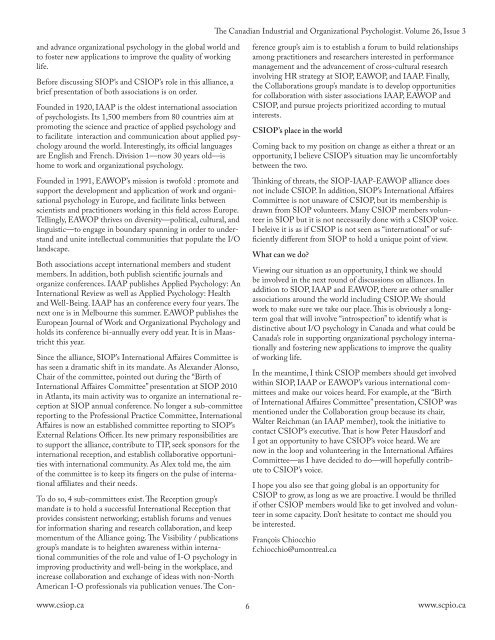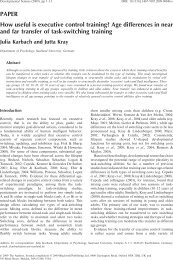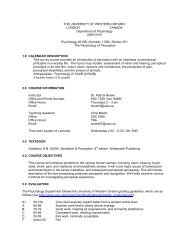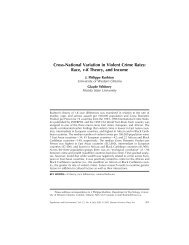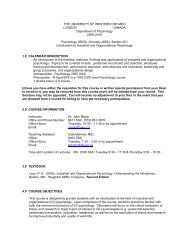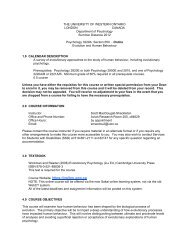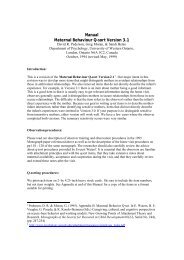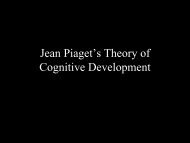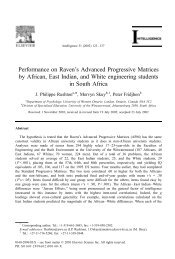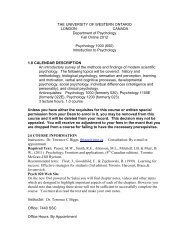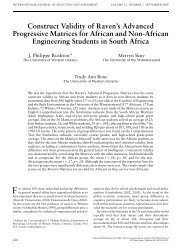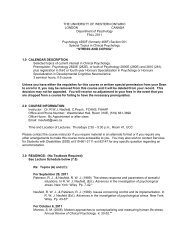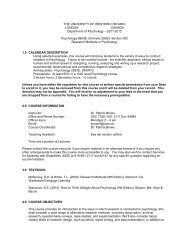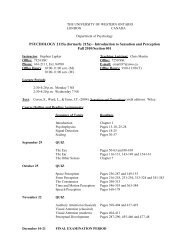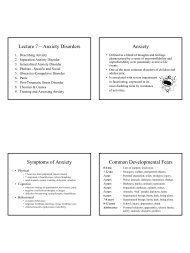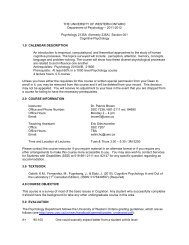The Canadian Industrial & Organizational Psychologist - Psychology ...
The Canadian Industrial & Organizational Psychologist - Psychology ...
The Canadian Industrial & Organizational Psychologist - Psychology ...
You also want an ePaper? Increase the reach of your titles
YUMPU automatically turns print PDFs into web optimized ePapers that Google loves.
and advance organizational psychology in the global world and<br />
to foster new applications to improve the quality of working<br />
life.<br />
Before discussing SIOP’s and CSIOP’s role in this alliance, a<br />
brief presentation of both associations is on order.<br />
Founded in 1920, IAAP is the oldest international association<br />
of psychologists. Its 1,500 members from 80 countries aim at<br />
promoting the science and practice of applied psychology and<br />
to facilitate interaction and communication about applied psychology<br />
around the world. Interestingly, its official languages<br />
are English and French. Division 1—now 30 years old—is<br />
home to work and organizational psychology.<br />
Founded in 1991, EAWOP’s mission is twofold : promote and<br />
support the development and application of work and organisational<br />
psychology in Europe, and facilitate links between<br />
scientists and practitioners working in this field across Europe.<br />
Tellingly, EAWOP thrives on diversity—political, cultural, and<br />
linguistic—to engage in boundary spanning in order to understand<br />
and unite intellectual communities that populate the I/O<br />
landscape.<br />
Both associations accept international members and student<br />
members. In addition, both publish scientific journals and<br />
organize conferences. IAAP publishes Applied <strong>Psychology</strong>: An<br />
International Review as well as Applied <strong>Psychology</strong>: Health<br />
and Well-Being. IAAP has an conference every four years. <strong>The</strong><br />
next one is in Melbourne this summer. EAWOP publishes the<br />
European Journal of Work and <strong>Organizational</strong> <strong>Psychology</strong> and<br />
holds its conference bi-annually every odd year. It is in Maastricht<br />
this year.<br />
Since the alliance, SIOP’s International Affaires Committee is<br />
has seen a dramatic shift in its mandate. As Alexander Alonso,<br />
Chair of the committee, pointed out during the “Birth of<br />
International Affaires Committee” presentation at SIOP 2010<br />
in Atlanta, its main activity was to organize an international reception<br />
at SIOP annual conference. No longer a sub-committee<br />
reporting to the Professional Practice Committee, International<br />
Affaires is now an established committee reporting to SIOP’s<br />
External Relations Officer. Its new primary responsibilities are<br />
to support the alliance, contribute to TIP, seek sponsors for the<br />
international reception, and establish collaborative opportunities<br />
with international community. As Alex told me, the aim<br />
of the committee is to keep its fingers on the pulse of international<br />
affiliates and their needs.<br />
To do so, 4 sub-committees exist. <strong>The</strong> Reception group’s<br />
mandate is to hold a successful International Reception that<br />
provides consistent networking; establish forums and venues<br />
for information sharing and research collaboration, and keep<br />
momentum of the Alliance going. <strong>The</strong> Visibility / publications<br />
group’s mandate is to heighten awareness within international<br />
communities of the role and value of I-O psychology in<br />
improving productivity and well-being in the workplace, and<br />
increase collaboration and exchange of ideas with non-North<br />
American I-O professionals via publication venues. <strong>The</strong> Con-<br />
<strong>The</strong> <strong>Canadian</strong> <strong>Industrial</strong> and <strong>Organizational</strong> <strong>Psychologist</strong>. Volume 26, Issue 3<br />
ference group’s aim is to establish a forum to build relationships<br />
among practitioners and researchers interested in performance<br />
management and the advancement of cross-cultural research<br />
involving HR strategy at SIOP, EAWOP, and IAAP. Finally,<br />
the Collaborations group’s mandate is to develop opportunities<br />
for collaboration with sister associations IAAP, EAWOP and<br />
CSIOP, and pursue projects prioritized according to mutual<br />
interests.<br />
CSIOP’s place in the world<br />
Coming back to my position on change as either a threat or an<br />
opportunity, I believe CSIOP’s situation may lie uncomfortably<br />
between the two.<br />
Thinking of threats, the SIOP-IAAP-EAWOP alliance does<br />
not include CSIOP. In addition, SIOP’s International Affaires<br />
Committee is not unaware of CSIOP, but its membership is<br />
drawn from SIOP volunteers. Many CSIOP members volunteer<br />
in SIOP but it is not necessarily done with a CSIOP voice.<br />
I beleive it is as if CSIOP is not seen as “international” or sufficiently<br />
different from SIOP to hold a unique point of view.<br />
What can we do?<br />
Viewing our situation as an opportunity, I think we should<br />
be involved in the next round of discussions on alliances. In<br />
addition to SIOP, IAAP and EAWOP, there are other smaller<br />
associations around the world including CSIOP. We should<br />
work to make sure we take our place. This is obviously a longterm<br />
goal that will involve “introspection” to identify what is<br />
distinctive about I/O psychology in Canada and what could be<br />
Canada’s role in supporting organizational psychology internationally<br />
and fostering new applications to improve the quality<br />
of working life.<br />
In the meantime, I think CSIOP members should get involved<br />
within SIOP, IAAP or EAWOP’s various international committees<br />
and make our voices heard. For example, at the “Birth<br />
of International Affaires Committee” presentation, CSIOP was<br />
mentioned under the Collaboration group because its chair,<br />
Walter Reichman (an IAAP member), took the initiative to<br />
contact CSIOP’s executive. That is how Peter Hausdorf and<br />
I got an opportunity to have CSIOP’s voice heard. We are<br />
now in the loop and volunteering in the International Affaires<br />
Committee—as I have decided to do—will hopefully contribute<br />
to CSIOP’s voice.<br />
I hope you also see that going global is an opportunity for<br />
CSIOP to grow, as long as we are proactive. I would be thrilled<br />
if other CSIOP members would like to get involved and volunteer<br />
in some capacity. Don’t hesitate to contact me should you<br />
be interested.<br />
François Chiocchio<br />
f.chiocchio@umontreal.ca<br />
www.csiop.ca 6<br />
www.scpio.ca


